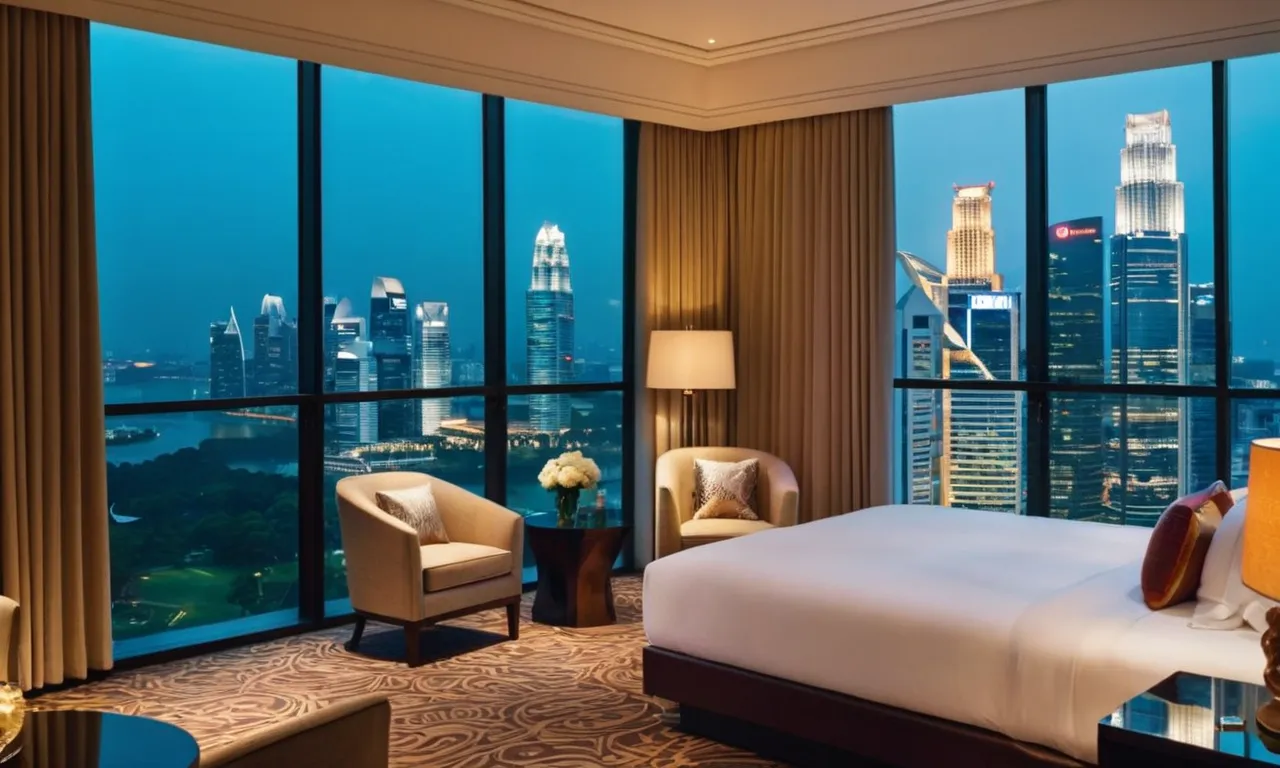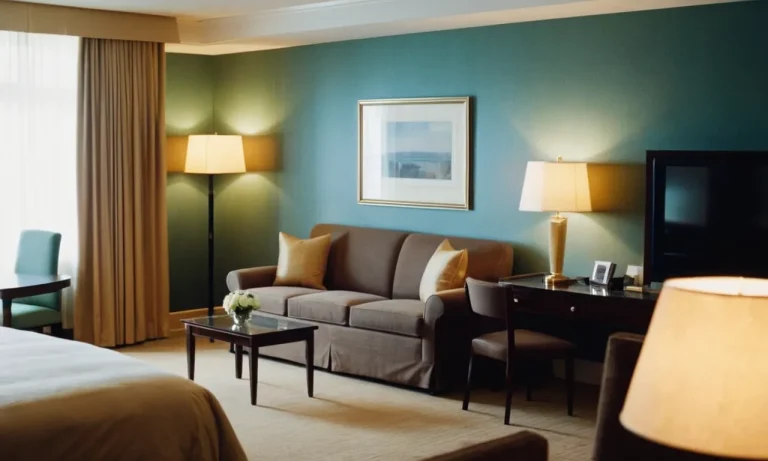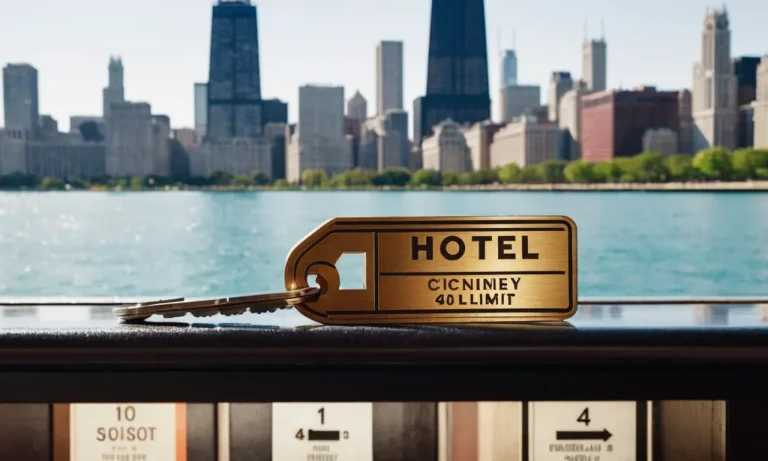Why Are Hotels In Singapore So Expensive Now?
Traveling to Singapore, the vibrant city-state renowned for its stunning skyline, world-class attractions, and diverse culinary scene, can be an unforgettable experience. However, one aspect that often catches visitors off guard is the staggering cost of hotel accommodations.
If you’re planning a trip to this Southeast Asian gem, you might be wondering, ‘Why are hotels in Singapore so expensive now?’
If you’re short on time, here’s a quick answer to your question: Hotels in Singapore are expensive due to a combination of factors, including high land costs, robust tourism demand, limited supply, and the city’s reputation as a premium destination.
In this comprehensive article, we’ll delve into the intricate reasons behind Singapore’s pricey hotel scene. From the island nation’s land scarcity to its thriving tourism industry and the government’s efforts to position Singapore as a luxury travel hub, we’ll uncover the driving forces that contribute to the high cost of accommodations.
Additionally, we’ll explore strategies to help you find more affordable options and make the most of your Singapore adventure.
Land Scarcity and High Property Costs
Singapore’s Limited Land Area
Singapore, an island city-state with a land area of just 728.6 square kilometers (Source: Singapore Department of Statistics), faces a unique challenge when it comes to land scarcity. With a population of over 5.6 million people, every inch of land is precious and highly coveted.
This limited land supply has a direct impact on the real estate market, including the hotel industry. 😮
Expensive Real Estate Market
Singapore’s real estate market is one of the most expensive in the world. According to PropertyGuru’s Singapore Property Market Outlook 2023, the average price of private residential properties in Singapore reached an all-time high of S$1,765 per square foot in 2022.
💰 This high cost of land acquisition and development directly translates into higher construction and operational costs for hotels. Building a hotel in Singapore can be a daunting and capital-intensive endeavor.
Impact on Hotel Development and Operations
The scarcity of land and high property costs in Singapore have a significant impact on the hotel industry. Hotel developers face the challenge of finding suitable and affordable sites, often leading to smaller room sizes and higher room rates to recoup their investments. According to Hotel News Resource, the average room rate for hotels in Singapore was around S$250 in 2022, making it one of the most expensive destinations for accommodation in the region.
Furthermore, the high operating costs associated with running a hotel in Singapore, including utilities, labor, and maintenance, contribute to the overall expense for guests. Hotels must strike a balance between offering top-notch amenities and services while keeping room rates competitive.
It’s a delicate dance that requires careful planning and strategic decision-making. 👯♀️
Despite these challenges, Singapore remains a popular destination for both leisure and business travelers, thanks to its world-class infrastructure, safety, and vibrant culture. However, the high cost of accommodation can be a deterrent for some budget-conscious travelers.
As the demand for hotel rooms continues to rise, it will be interesting to see how the industry adapts and innovates to meet the needs of visitors while maintaining profitability in this land-scarce and expensive real estate market. 🤔
Robust Tourism Demand and Limited Supply
Singapore’s allure as a top-notch travel destination has been steadily rising, fueling a surge in visitor arrivals that has outpaced the growth of its hotel room supply. This mismatch between robust demand and limited availability is a key factor driving up accommodation prices in the city-state.
Singapore’s Popularity as a Travel Destination
Singapore has long been a popular stopover for travelers, but in recent years, it has emerged as a sought-after destination in its own right. The country’s reputation for safety, cleanliness, and efficiency, coupled with its impressive array of attractions, including world-class museums, iconic landmarks like the Marina Bay Sands, and a vibrant culinary scene, has drawn visitors from around the globe.
Its strategic location in Southeast Asia also makes it a convenient hub for exploring the region.
Increasing Visitor Arrivals
The numbers speak for themselves. According to the Singapore Tourism Board, the city-state welcomed a record 19.1 million international visitors in 2019, a 3.3% increase from the previous year. While the COVID-19 pandemic temporarily halted this upward trajectory, visitor arrivals have been steadily recovering, reaching 6.3 million in 2022 – a remarkable 972.7% increase from 2021.
- In 2019, Singapore welcomed a record 19.1 million international visitors, a 3.3% increase from 2018.
- Visitor arrivals reached 6.3 million in 2022, a 972.7% increase from 2021.
Limited Hotel Room Supply
Despite the soaring demand, Singapore’s hotel room supply has struggled to keep pace. While new hotels have been added, the city-state’s limited land area and high construction costs have constrained the rate of expansion.
As a result, occupancy rates have remained high, averaging around 85% in 2022, according to data from the Singapore Tourism Board. This tight supply, combined with the influx of visitors, has allowed hotels to raise their rates, making accommodation in Singapore increasingly expensive.
Don’t be surprised if you find yourself paying a premium for a hotel room in Singapore – the city’s growing popularity as a travel hotspot and limited accommodation options have created a perfect storm for rising prices.
But hey, the experience of exploring this amazing destination is worth every penny, right? 😊
Positioning as a Premium Destination
Singapore has strategically positioned itself as a premium tourist destination, attracting high-end travelers and luxury seekers from around the world. The city-state’s government has implemented a focused tourism strategy aimed at cultivating an image of exclusivity and opulence, which has directly impacted the pricing of hotels and accommodations.
Government’s Tourism Strategy
The Singapore Tourism Board (STB), a statutory board under the Ministry of Trade and Industry, has played a pivotal role in shaping the country’s tourism landscape. Their initiatives have centered around promoting Singapore as a sophisticated and luxurious destination, catering to affluent visitors.
This strategy aligns with the broader vision of positioning Singapore as a hub for business, finance, and high-end experiences.
According to STB’s website, in 2019, Singapore welcomed 19.1 million international visitors, with a significant portion (around 30%) hailing from the high-spending markets of China, Indonesia, and India.
The government’s efforts to attract these high-spending travelers have contributed to the rise in hotel prices, as hotels strive to meet the expectations of this lucrative market segment.
Focus on Luxury and High-End Experiences
Singapore’s tourism strategy places a strong emphasis on offering luxurious and exclusive experiences. From world-class shopping destinations like Orchard Road and Marina Bay Sands to Michelin-starred restaurants and ultra-modern attractions like the Gardens by the Bay, the city-state has positioned itself as a playground for the wealthy and discerning traveler.
This focus on luxury has driven hotels to invest heavily in upscale amenities, state-of-the-art facilities, and personalized services, which inevitably translates into higher room rates. According to Hotel News Resource, the average daily rate for a luxury hotel in Singapore in 2022 was around $350, with some properties commanding rates well over $1,000 per night.
😲
Attracting Affluent Travelers
Singapore’s positioning as a premium destination has been successful in attracting affluent travelers from around the world. The country’s reputation for safety, cleanliness, and efficiency, combined with its diverse cultural offerings and top-notch infrastructure, make it an attractive choice for those seeking a luxurious and hassle-free travel experience.
To cater to this high-end market, hotels in Singapore have invested in exclusive amenities, personalized services, and unique experiences. From private butler services and rooftop infinity pools to world-class spas and Michelin-starred restaurants, hotels in the city-state strive to offer an unparalleled level of luxury and indulgence, justifying their premium pricing.
According to The Straits Times, tourism arrivals in Singapore hit a record high of 6.69 million visitors in 2022, a testament to the country’s appeal as a premium destination. With the government’s continued focus on attracting high-spending travelers, it’s likely that hotel prices in Singapore will remain on the higher end of the spectrum.
Strategies for Finding Affordable Accommodations
Booking in Advance
One of the most effective ways to secure affordable accommodations in Singapore is to plan and book well in advance. Hotels in this bustling city often experience high occupancy rates, especially during peak travel seasons and major events.
By booking your stay several months in advance, you increase your chances of finding rooms at lower rates before prices start to surge due to high demand. Many hotels offer early bird discounts or promotional rates for those who book early.
Additionally, you can monitor Agoda or Booking.com for flash sales or last-minute deals, which can sometimes yield significant savings.
Considering Alternative Accommodations
Singapore is home to a diverse range of accommodation options beyond traditional hotels. Consider exploring alternative accommodations such as serviced apartments, hostels, or vacation rentals through platforms like Airbnb or VRBO.
These options can often be more affordable, especially for longer stays or when traveling with a group. Hostels, in particular, offer budget-friendly shared accommodations, perfect for solo travelers or backpackers.
According to HostelBookers, the average cost of a hostel bed in Singapore is around $25 per night 😍, significantly lower than the average hotel room rate.
Exploring Nearby Destinations
If your primary purpose for visiting Singapore is not business-related, consider staying in nearby destinations just across the border. Cities like Johor Bahru in Malaysia or Batam in Indonesia offer more affordable accommodation options while still being within a reasonable distance from Singapore.
You can easily commute to Singapore via public transportation or ride-sharing services. This strategy can save you a considerable amount of money, especially if you don’t mind the extra travel time. According to TripAdvisor, hotel rates in Johor Bahru are often 50% lower than in Singapore 🎉, making it an attractive option for budget-conscious travelers.
- Pro Tip: When exploring nearby destinations, be sure to factor in the cost of transportation and ensure that the savings on accommodations outweigh the additional travel expenses.
Conclusion
Singapore’s hotel scene is undoubtedly expensive, but understanding the underlying reasons can help travelers plan their trips more effectively. From the city-state’s limited land area and robust tourism demand to its positioning as a premium destination, various factors contribute to the high cost of accommodations.
While luxury hotels and upscale experiences are a hallmark of Singapore’s tourism industry, savvy travelers can still find affordable options by booking in advance, considering alternative accommodations like serviced apartments or Airbnb rentals, or exploring nearby destinations in the region.
Ultimately, Singapore’s allure lies in its unique blend of modernity, cultural diversity, and world-class attractions. By being mindful of costs and exploring various accommodation options, visitors can enjoy the best of what this vibrant city-state has to offer without breaking the bank.








